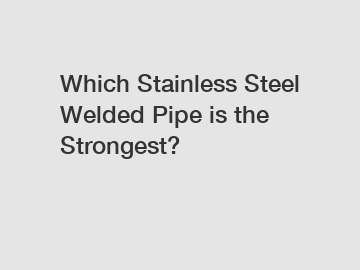Which Stainless Steel Welded Pipe is the Strongest?
Stainless steel welded pipes are a critical component in various industrial applications, from construction and automotive to petrochemical and pharmaceutical industries. Understanding the strength of these pipes is vital for ensuring long-lasting and reliable connections. With numerous types and grades available, it can be challenging to determine which stainless steel welded pipe is the strongest. In this blog, we will navigate through the intricacies of stainless steel pipes, exploring their characteristics, durability, and highlighting the most robust options.
Understanding Stainless Steel:
Stainless steel is an alloy primarily composed of iron, chromium, and other elements such as nickel and molybdenum. The presence of a minimum of 10.5% chromium creates a thin, invisible oxide layer on the surface, protecting it from corrosion and giving stainless steel its renowned resistance to rust and staining.

Factors Affecting Strength:
Several factors contribute to the strength and durability of stainless steel welded pipes. These include:
1. Grade: Stainless steel grades offer different mechanical properties, such as tensile strength and elongation. The two most commonly used grades for welded pipes are 304 and 316, each with its unique blend of elements, making them suitable for various applications.
2. Manufacturing Process: Welded pipes are typically produced using two primary methods – the electric resistance welding (ERW) process and the submerged arc welding (SAW) process. The manufacturing process can affect the pipe's strength due to factors like heat treatment, control of material microstructure, and weld integrity.
The Strongest Stainless Steel Welded Pipe Options:
1. Type 316/316L: Known for its exceptional corrosion resistance, Type 316 stainless steel is a popular choice in aggressive environments such as marine applications and chemical processing plants. Its increased molybdenum content compared to Type 304 provides enhanced resistance to pitting corrosion. Type 316L, with its lower carbon content, further improves weldability and eliminates the risk of carbide precipitation.
2. Duplex Stainless Steel: Comprising a mixed microstructure of austenite and ferrite, duplex stainless steel is highly resistant to corrosion and demonstrates superior strength compared to conventional stainless steel. It offers an efficient balance of corrosion resistance and cost-effectiveness, making it an excellent choice for various industries.
3. Super Duplex Stainless Steel: Super duplex stainless steel possesses even greater strength and corrosion resistance due to its higher chromium, molybdenum, and nitrogen content. Its exceptional effectiveness in extreme environments makes it suitable for applications where safety, reliability, and longevity are paramount.
4. High-Nickel Alloys: Certain high-nickel alloys, such as Alloy 625 and Alloy 825, exhibit exceptional strength and resistance to corrosion. These alloys find use in demanding applications, including offshore oil and gas platforms, where durability in harsh marine environments is crucial.
Factors Beyond Strength:
While strength is a vital consideration, there are several other factors to evaluate when selecting a stainless steel welded pipe:
1. Corrosion Resistance: Depending on the application, resistance to corrosion may be of utmost importance. Consider the environment the pipe will be exposed to and choose a grade accordingly.
2. Weldability: Some grades of stainless steel exhibit better weldability than others. This is important for ensuring a secure and reliable connection during installation.
3. Cost: Balancing strength, corrosion resistance, and cost is crucial in many projects. It is essential to consider the overall lifecycle costs of the stainless steel welded pipe to make an informed decision.
Conclusion:
Selecting the strongest stainless steel welded pipe requires a comprehensive evaluation of various factors, including grade, manufacturing process, and intended application. Type 316/316L, duplex stainless steel, and super duplex stainless steel are among the strongest options available, renowned for their exceptional corrosion resistance and robust mechanical properties. However, it is vital to consider the specific requirements of your project, including budget, weldability, and environmental conditions, to make the most suitable selection. By understanding the intricacies of stainless steel pipes and their strength, you can ensure the longevity and reliability of your industrial applications.
For more information, please visit nickel alloys steel pipes, alloy 601 tube, ASTM B163 UNS N04400 Tube.
186
0
0


Comments
All Comments (0)